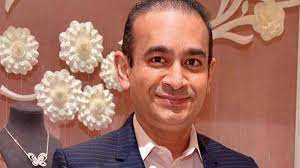NEW DELHI, Nov 9: The absconding diamond merchant from Gujarat Nirav Modi who fled India after allegedly cheating a government bank of over ₹ 11,000 crore, is a step closer to being extradited to India from the United Kingdom.
Mr Modi, 51, lost the appeal in the London High Court on Wednesday against being sent back to India to face trial in the massive fraud case linked to Punjab National Bank, or PNB. The Lord Justice Jeremy Stuart-Smith and Justice Robert Jay, who heard the appeal earlier this year, delivered the verdict that allowed the fugitive businessman’s extradition to India.
“…We are far from satisfied that Mr Modi’s mental condition and the risk of suicide are such that it would be either unjust or oppressive to extradite him,” the court said and added that District Judge Sam Goozee’s Westminster Magistrates’ Court order from last year in favour of extradition was “sound.”
The leave to appeal in the High Court had been granted on two grounds — under Article 3 of the European Convention of Human Rights (ECHR) to hear arguments if it would be “unjust or oppressive” to extradite 51-year-old Mr. Modi due to his mental state and Section 91 of the Extradition Act 2003, also related to mental health.
“Pulling these various strands together and weighing them in the balance so as to reach an overall evaluative judgment on the question raised by Section 91, we are far from satisfied that Mr. Modi’s mental condition and the risk of suicide are such that it would be either unjust or oppressive to extradite him,” the ruling states. “It may be that the main benefit of the appeal has been to obtain the extensive further [Indian Government] assurances that we have identified in the course of this judgment, which render the position clear to Mr. Modi’s advantage and the District Judge’s decision supportable,” the judges ruled.
The process to bring Mr Modi from London to Mumbai’s Arthur Road Jail still has some way to go. His uncle, Mehul Choksi, who has taken up citizenship of Antigua and Barbuda, is also accused of cheating PNB and wanted by Indian agencies.
As he has lost this appeal hearing, Mr. Modi can approach the Supreme Court on a point of law of public importance, to be applied for to the Supreme Court against the High Court’s decision within 14 days of a High Court verdict. However, this involves a high threshold as appeals to the Supreme Court can only be made if the High Court has certified that the case involves a point of law of general public importance.
Finally, after all avenues in the UK courts are exhausted, the diamantaire could still seek a so-called Rule 39 injunction from the European Court of Human Rights (ECHR). His legal team hasn’t said what they plan to do next after today’s setback. In the meantime, the fugitive businessman will remain at the London jail where he was first kept after he was arrested in March 2019.
Mr. Modi is the subject of two sets of criminal proceedings, with the Central Bureau of Investigation (CBI) case relating to a large-scale fraud upon PNB through the fraudulent obtaining of letters of undertaking (LoUs) or loan agreements, and the Enforcement Directorate (ED) case relating to the laundering of the proceeds of that fraud. He also faces two additional charges of “causing the disappearance of evidence” and intimidating witnesses or “criminal intimidation to cause death”, which were added to the CBI case.
Mr Modi is wanted by both the Central Bureau of Investigation and the Enforcement Directorate. The fugitive and the firms he controlled allegedly leveraged the loopholes in the banking system by seeking letters of undertaking, or LoU, and raising credit from foreign banks to pay its merchants.
A LoU is a bank guarantee issued for overseas import payments. For years, Mr Modi and his three firms had been allegedly taking LoUs from PNB. These bank guarantees allegedly helped Mr Modi raise short-term loans from foreign branches of Indian banks to pay to suppliers of raw material. The money was then transferred through a maze of sorts.
(Manas Dasgupta)

